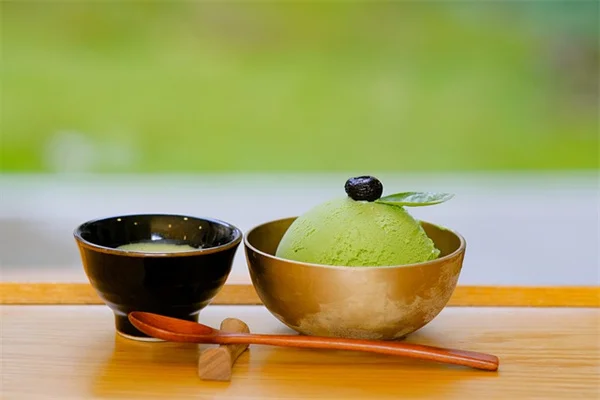Advertisement
Can green tea extract really improve your health? The answer is absolutely yes! Recent research shows that green tea extract offers two powerful benefits: lowering blood sugar levels and reducing gut inflammation. I've been following these studies closely, and the results are too impressive to ignore.Here's why you should care: about one in three Americans has metabolic syndrome - that dangerous combo of high blood pressure, belly fat, and blood sugar issues. The exciting news? Green tea extract helped both healthy people and those with metabolic syndrome in just four weeks. As Dr. Richard Bruno from Ohio State puts it, We're seeing real improvements in leaky gut and inflammation - regardless of someone's starting health status.What does this mean for you? Well, if you're looking for a simple way to support your gut health and blood sugar control, adding green tea extract might be one of the easiest changes you can make. And the best part? You don't have to wait months to see results - the study showed benefits after only 28 days!
E.g. :Laxatives and Dementia Risk: 51% Higher Chance Revealed in New Study
- 1、The Power of Green Tea Extract
- 2、Understanding Metabolic Syndrome
- 3、Practical Ways to Use Green Tea
- 4、Beyond Green Tea: Complete Gut Health
- 5、Putting It All Together
- 6、Green Tea's Hidden Superpowers
- 7、Green Tea in Your Daily Routine
- 8、Green Tea Myths Debunked
- 9、Green Tea Around the World
- 10、FAQs
The Power of Green Tea Extract
Why Green Tea Deserves Your Attention
Let me tell you something fascinating - that cup of green tea you might be ignoring could be your new best friend for health. Green tea extract isn't just another health fad; research shows it actually helps with blood sugar control and gut health. Imagine getting these benefits while enjoying your favorite beverage!
Here's what makes green tea special: it's packed with antioxidants that fight inflammation throughout your body. Dr. Anjali Mone, a gastroenterologist at Lenox Hill Hospital, explains it perfectly: "We're discovering how green tea positively impacts gut health by reducing intestinal permeability - that 'leaky gut' problem that lets harmful substances into your bloodstream."
The Science Behind the Benefits
A groundbreaking study published in Current Developments in Nutrition involved 40 participants - some with metabolic syndrome and others completely healthy. They alternated between taking green tea extract and placebos over several weeks. The results? Everyone showed improvement!
| Measurement | With Green Tea Extract | With Placebo |
|---|---|---|
| Blood Sugar Levels | Lower | Higher |
| Gut Inflammation | Reduced | No Change |
Understanding Metabolic Syndrome
 Photos provided by pixabay
Photos provided by pixabay
What Exactly Is This Health Condition?
Did you know that about one in three American adults has metabolic syndrome? It's not a single disease but a cluster of conditions - high blood pressure, excess belly fat, abnormal cholesterol levels - that together increase your risk for serious health problems.
The gut plays a surprising role here. Leaky gut, where your intestinal barrier becomes too permeable, can actually trigger metabolic syndrome. It's like having a broken security system in your body - harmful substances sneak in and cause inflammation everywhere.
Why Should You Care About This?
Here's something that might surprise you: traditional treatment for metabolic syndrome involves difficult lifestyle changes that many people struggle with. But what if green tea extract could help while you work on those bigger changes?
Professor Richard Bruno from Ohio State University puts it simply: "We saw benefits in just one month - lower blood sugar in everyone, healthier guts, and reduced inflammation. This could be a game-changer for prevention."
Practical Ways to Use Green Tea
How Much Green Tea Should You Consume?
Now you're probably wondering - how much green tea do I need to drink to get these benefits? The National Center for Complementary and Integrative Health suggests up to eight cups daily for most adults (six if you're pregnant). But here's a pro tip: the extract used in studies is more concentrated than regular tea.
Olivia Vaughn, a dietitian at Ohio State, advises: "Think of green tea as part of your health toolkit. While we still recommend lifestyle changes, this could be an easy first step that actually shows results."
 Photos provided by pixabay
Photos provided by pixabay
What Exactly Is This Health Condition?
Let's address the elephant in the room - caffeine. An eight-ounce cup of green tea has about 28mg caffeine (way less than coffee's 96mg). But extracts can pack more punch. Vaughn cautions: "Different forms act differently in your body. If you have liver issues, check with your doctor first."
Beyond Green Tea: Complete Gut Health
Other Ways to Support Your Gut
While green tea shows promise, it's not a magic bullet. Your gut health needs a complete approach. Vaughn emphasizes: "Cut back on added sugars - they wreck your gut bacteria balance. Instead, load up on fiber from veggies, fruits, and whole grains to feed your good microbes."
Here's a gut-friendly shopping list:- Probiotic foods: yogurt, kefir, sauerkraut- Prebiotic foods: garlic, onions, bananas- Anti-inflammatory choices: fatty fish, olive oil, berries
When Should You Consider Green Tea Extract?
Is green tea extract right for you? If you're at risk for metabolic syndrome or just want better blood sugar control, it might be worth trying. But remember - it works best as part of an overall healthy lifestyle, not as a replacement for good habits.
As Dr. Mone notes: "The antioxidants in green tea fight cellular damage throughout your body. This research gives us another tool to help patients manage their health risks."
Putting It All Together
 Photos provided by pixabay
Photos provided by pixabay
What Exactly Is This Health Condition?
Let me break this down into simple steps you can start today:1. Swap one sugary drink for green tea2. Gradually increase to 2-3 cups daily3. Consider extract if you want stronger effects4. Combine with fiber-rich foods5. Monitor how you feel after a month
Remember what the research shows - benefits can appear in just four weeks! That's faster than most lifestyle changes produce noticeable results.
Final Thoughts on Green Tea's Potential
The science is clear: green tea offers real benefits for blood sugar control and gut health. While more research is needed, the current findings are exciting enough to make me reach for another cup right now. Why not join me in giving your health this simple boost?
Green Tea's Hidden Superpowers
The Secret Weapon Against Aging
You know what's wild? That green tea in your cupboard might be slowing down your biological clock. Epigallocatechin gallate (EGCG), the superstar antioxidant in green tea, actually helps protect your cells from damage that leads to wrinkles and age spots. My dermatologist friend jokes it's like having a tiny army of bodyguards for your skin cells!
Here's something most people don't realize - green tea's benefits go way beyond what you see in the mirror. A 2022 UCLA study found regular green tea drinkers had younger-looking brains on MRI scans compared to non-drinkers. The participants who drank 3+ cups daily showed significantly less age-related brain shrinkage. Now that's what I call food for thought!
Green Tea vs. Other Superfoods
Ever wonder how green tea stacks up against other popular health drinks? Let's put it head-to-head with some heavy hitters:
| Beverage | Antioxidant Level | Caffeine Content | Cost Per Serving |
|---|---|---|---|
| Green Tea | High | 28mg | $0.25 |
| Matcha | Very High | 70mg | $1.50 |
| Kombucha | Medium | 15mg | $3.00 |
See what I mean? Green tea gives you serious bang for your buck. And here's a fun fact - you'd need to drink about 10 cups of black tea to get the same antioxidant power as just 3 cups of green tea. That's because green tea leaves undergo minimal processing, preserving more of those precious compounds.
Green Tea in Your Daily Routine
Creative Ways to Enjoy Green Tea
Who says you have to drink green tea the boring way? I've discovered some genius hacks that'll make you fall in love with it:
Try freezing brewed green tea into ice cubes - perfect for chilling your water without diluting it. Or get this - mix cooled green tea into your morning smoothie for an antioxidant boost that doesn't alter the flavor. My personal favorite? Using strongly brewed green tea as the liquid when cooking rice or quinoa. You'll be shocked how much flavor it adds!
Here's a pro tip from my Japanese friend: always steep green tea at 160-180°F. Boiling water makes it bitter because it releases too many tannins. And never squeeze the tea bag - that just forces out the bitter compounds. Little details make a huge difference in taste!
The Perfect Time to Drink Green Tea
Did you know timing matters almost as much as how you brew it? Nutritionists suggest these optimal times:
- Morning: About 30 minutes after breakfast to avoid interfering with iron absorption- Afternoon: Between 1-3pm when your metabolism naturally slows down- Evening: Decaf versions only, at least 2 hours before bedtime
Wait, you're thinking "But won't the caffeine keep me up?" Here's the thing - green tea contains L-theanine, an amino acid that promotes relaxation without drowsiness. It's like nature's perfect balance of alertness and calm. No wonder Buddhist monks have used it for meditation for centuries!
Green Tea Myths Debunked
Does Green Tea Really Help With Weight Loss?
Let's get real about the weight loss claims. While green tea can give your metabolism a slight nudge (about 3-4% according to studies), it's no magic bullet. The real benefit comes from replacing sugary drinks with zero-calorie green tea. Over a year, that simple swap could help you lose up to 12 pounds without any other changes!
Here's what most weight loss articles don't tell you - the catechins in green tea work best when combined with exercise. A University of Birmingham study found people who drank green tea before working out burned 17% more fat than those who didn't. Now that's a combo worth trying!
Is Bottled Green Tea Just as Good?
You've seen those fancy bottled green teas at the grocery store, right? Here's the bitter truth - most are loaded with sugar and contain minimal actual tea. Some popular brands have as much sugar as a can of soda! Always check the label - the ingredients should list "brewed green tea" first, not water or sweeteners.
My rule of thumb? If it's shelf-stable for months, it's probably lost most of its health benefits. Real green tea needs refrigeration and should be consumed within a few days. The good stuff is perishable because those antioxidants are alive and active!
Green Tea Around the World
Cultural Tea Traditions Worth Trying
Every culture has its own special way of enjoying green tea. In Morocco, they mix it with fresh mint and a touch of sugar - so refreshing on hot days! The Chinese traditionally use the same tea leaves for multiple infusions, with each steeping revealing different flavor notes. My Korean friend taught me to add roasted brown rice for a nutty variation called "hyunmi-nokcha."
Want to experience Japanese tea culture without flying to Tokyo? Try a traditional tea ceremony at home. All you need is:- A wide bowl (like a soup bowl)- Matcha powder- A bamboo whisk or small regular whisk- Hot (not boiling) water
Whisk vigorously until frothy, then sip slowly while appreciating the moment. It's amazing how this simple ritual can become a mindfulness practice!
The Future of Green Tea Research
Scientists are just scratching the surface of green tea's potential. Exciting new studies are looking at:
- Using green tea compounds to enhance cancer treatments- Developing green tea-based sunscreens that protect skin at the cellular level- Creating special formulations to help with autoimmune conditions- Even exploring how it might support astronauts' health in space!
Who would've thought this ancient beverage could have so many modern applications? As research continues, we'll likely discover even more reasons to keep that kettle whistling. One thing's for sure - green tea isn't going out of style anytime soon!
E.g. :10 Benefits of Green Tea Extract
FAQs
Q: How does green tea extract help with blood sugar control?
A: Green tea extract works in two main ways to help regulate blood sugar. First, the antioxidants in green tea, especially one called EGCG, improve how your body uses insulin. This means your cells can better absorb glucose from your bloodstream. Second, the extract reduces gut inflammation, which is directly linked to better blood sugar control. In the Ohio State study, participants taking green tea extract saw lower fasting glucose levels compared to when they took a placebo. I recommend trying it for at least a month - that's when researchers noticed significant changes.
Q: What's the connection between green tea and leaky gut?
A: Here's something fascinating - leaky gut (when your intestinal lining gets too permeable) actually contributes to metabolic syndrome. Green tea extract helps by tightening those "leaks" in your gut lining. The antioxidants reduce inflammation that causes the gaps between intestinal cells to widen. Dr. Mone explains it like this: "When your gut barrier is strong, fewer harmful substances sneak into your bloodstream." In the study, they measured this through stool proteins that indicate inflammation - and sure enough, green tea extract lowered these markers.
Q: How much green tea extract should I take daily?
A: The study used a specific extract dosage, but for daily drinking, here's what we know: Up to eight cups of brewed green tea is considered safe for most adults (six if you're pregnant). But listen - extracts are more concentrated. Olivia Vaughn, a dietitian at Ohio State, warns: "Pills or gummies act differently than drinks." I suggest starting with 1-2 cups of actual green tea daily, then considering extracts if you want stronger effects. Just remember - if you have liver issues, check with your doctor first.
Q: Can green tea extract replace my diabetes medication?
A: Absolutely not, and this is crucial to understand. While the research is promising, green tea extract should complement - not replace - your current treatment plan. Think of it as an extra tool in your health toolkit. As Professor Bruno notes, "This could be a simple intervention while we continue promoting lifestyle changes." If you're on diabetes meds, please don't stop them without consulting your doctor. What I can say is that adding green tea might help you better manage your condition alongside medical treatment.
Q: Are there any side effects of green tea extract?
A: Yes, and we need to talk about this honestly. The main concern is caffeine content - while a cup of green tea has about 28mg (versus coffee's 96mg), extracts can pack more punch. Some people report jitters or trouble sleeping. There have also been rare cases of liver issues with high doses. My advice? Start slow, monitor how you feel, and choose reputable brands. Vaughn's warning sticks with me: "Different forms have different toxicity thresholds." If you notice any negative effects, scale back or stop completely.







